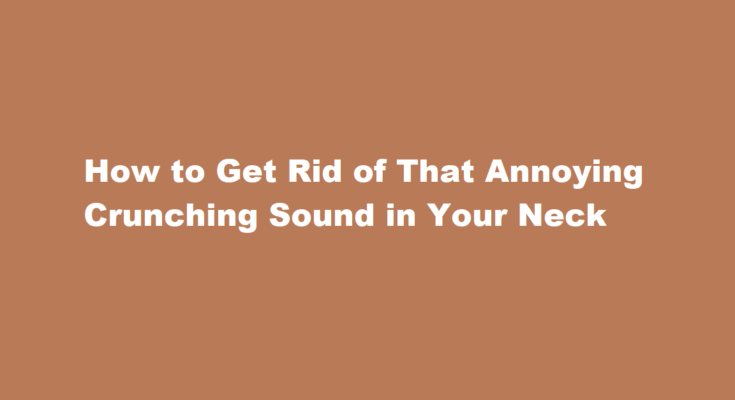Introduction
Have you ever experienced the unsettling sensation of your neck making a crunching sound when you move it? This peculiar phenomenon is quite common and can be accompanied by discomfort or even pain. While it might not always indicate a serious problem, the crunching sound in your neck can be bothersome and raise concerns about your overall neck health. In this article, we will explore various causes of neck crunching and provide you with practical tips on how to alleviate and prevent this discomfort.
Understanding the Causes
Before diving into solutions, it’s important to understand what might be causing the crunching sound in your neck. The primary reasons behind neck crunching include
1. Cervical Osteoarthritis: One of the most common causes of neck crunching is cervical osteoarthritis, which occurs due to the wear and tear of the cartilage and bones in the neck. As these structures degenerate over time, they can produce cracking or crunching noises when you move your neck.
2. Muscle Tightness: Muscle tension and stiffness in the neck can lead to crunching sounds as well. When the muscles around your neck are tight, they may rub against each other or the surrounding structures, causing noise during movement.
3. Poor Posture: Maintaining poor posture for extended periods can put excessive stress on the neck, resulting in crunching sounds. The neck’s natural alignment is compromised, leading to friction and discomfort.
4. Air or Gas Release: Sometimes, the sounds may occur due to the release of air or gas bubbles in the joints. This is similar to the sound produced when you crack your knuckles.
5. Age-Related Changes: As you age, your joints, ligaments, and tendons may undergo changes that lead to increased friction and noise during movement.
How to Get Rid of Neck Crunching
1. Stay Hydrated: Dehydration can contribute to joint stiffness and increased friction in the neck. Ensure you drink enough water throughout the day to keep your joints lubricated and functioning smoothly.
2. Neck Stretches and Exercises: Regular neck stretches and exercises can help improve muscle strength and flexibility. Incorporate gentle neck rotations, tilts, and stretches into your daily routine to reduce muscle tension and alleviate neck crunching.
3. Maintain Good Posture: Proper posture is crucial for preventing and reducing neck crunching. Be conscious of your posture while sitting and standing. Use ergonomic chairs and desks that support your neck and maintain the natural curve of your spine.
4. Heat and Cold Therapy: Applying heat or cold to your neck can help reduce muscle tension and inflammation. Use a heating pad or a cold pack for 15-20 minutes at a time, depending on your preference and comfort.
5. Over-the-Counter Pain Relief: If the neck crunching is associated with pain or discomfort, over-the-counter pain relievers like ibuprofen or acetaminophen can provide temporary relief. However, consult with a healthcare professional before using any medication.
6. Physical Therapy: If the neck crunching is persistent and causing significant discomfort, consider consulting a physical therapist. They can provide personalized exercises and techniques to improve neck mobility and alleviate the issue.
7. Chiropractic Care: Chiropractic adjustments may be beneficial for some individuals with neck crunching. A qualified chiropractor can perform manual adjustments to help align the spine and reduce joint friction.
8. Massage Therapy: Professional massage therapy can help relax the muscles in the neck and reduce tension, which may contribute to the crunching sound.
9. Avoid Repetitive Movements: If you engage in activities that require repetitive neck movements, try to limit these actions. Overuse of certain neck muscles can exacerbate the issue.
10. Mindful Neck Movements: When you move your neck, do so slowly and mindfully. Avoid sudden, jerky motions that can increase friction and cause crunching sounds.
When to Seek Medical Attention
While neck crunching is often benign and can be managed with the aforementioned tips, there are situations where it’s crucial to seek medical attention
1. Severe or Persistent Pain: If your neck crunching is accompanied by severe or persistent pain, it may indicate an underlying issue that requires medical evaluation.
2. Numbness or Tingling: If you experience numbness or tingling in your arms, hands, or fingers along with neck crunching, it may suggest nerve compression, and medical attention is necessary.
3. Recent Injury: If you recently had a neck injury or accident and now experience neck crunching, consult a healthcare professional to rule out any serious damage.
4. Other Unusual Symptoms: If you notice other unusual symptoms such as weakness, difficulty swallowing, or changes in speech, it’s essential to see a doctor promptly.
FREQUENTLY ASKED QUESTIONS
Does neck crunching go away?
For example, neck cracking and grinding might occur frequently for a few days and then go away. In cases where neck crepitus is the result of bone-on-bone grinding due to facet joint osteoarthritis, the neck cracking and grinding sounds are more likely to occur frequently with movements and not go away.
Is it normal to hear crunching in your neck?
Crepitus can occur in any moveable joint in your body. Neck crepitus is a rather common occurrence, and many people have experienced it. For example, maybe you have heard a neck cracking or neck popping sound when you look over your shoulder. This is an example of neck crepitus.
Conclusion
Neck crunching can be a source of annoyance and discomfort, but it is often manageable with simple lifestyle changes and self-care practices. Maintaining good posture, staying hydrated, and incorporating neck stretches into your daily routine can help alleviate the issue. However, if you experience severe pain, numbness, or other concerning symptoms, it’s crucial to seek medical attention to rule out any underlying conditions. Remember that your neck’s health is important, and taking proactive steps to address neck crunching can lead to improved comfort and overall well-being.



